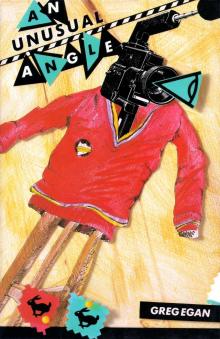The Four Thousand, the Eight Hundred Read online
Page 2
4
On their way to the hospital, Anna insisted that they make a detour to the fruit market.
“You don’t think they’re feeding him properly?” Chloe joked.
“It’s just a gesture,” Anna replied, rummaging through a stack of plums. Her Assistant started annotating each fruit with nutritional estimates, but Anna waved the data away. What mattered was the shape and colour, and she could judge those qualities herself.
“He’s not really ill,” Chloe observed, as if that had some bearing on the relevance of the gift. “Every rider goes through the same stages. It’s a normal transition.”
“I see. So three years on an intravenous drip in lieu of food and air is no big deal: it’s as natural as puberty or menopause.”
Chloe persisted. “The Vestans call those life-support pods ‘cocoons’. So they must think of the process as a kind of metamorphosis.”
“You brought me flowers when I had Sasha,” Anna recalled. “Was I ill?”
“No.”
Anna chose two plums, two apples and two mandarins. It was probably too much to eat, but anything less would have looked miserly. “Buy these,” she told her Assistant. She put the fruit in her backpack and bounded away from the stall, in her haste almost missing the guide rope she’d been aiming for. Chloe caught up with her, tumbling elegantly in midair before taking a handhold beside her.
As they entered the hospital, Anna began to have second thoughts. Her Assistant had had no trouble booking the visit, so both the rider himself and the doctors treating him must have agreed to it, but what if she was intruding? Most new arrivals had plenty of contacts among the established Vestan émigrés, and there were professional social workers to ease the path into Cererian society for the few who didn’t. Why would this man want some random bureaucrat turning up for no reason, carrying enough vegetable fibre to tear a new hole in his atrophied colon?
They turned off the corridor into the ward. Most of the beds had their privacy curtains in place, but they didn’t need to go far to see where their company was expected.
“Anna?” The rider was propped up on a stack of pillows, beaming at her. Her Assistant captioned his face as “Olivier Druillet”, but an icon beside the name warned her that some glitch had prevented a reciprocal annotation.
“That’s right,” Anna replied—in French, hoping that that wasn’t condescending. For a second she was flustered by the system’s failure to handle all the niceties, but then she got her bearings and introduced Chloe. She geckoed her soles and approached the bed on foot, preparing to offer her hand, but then Olivier leant forward and embraced her.
“Thank you for coming,” he said, accepting her choice of language.
“It’s my pleasure,” Anna replied. Chloe kept her distance, smiling amiably. “How are you feeling?”
“Still a little groggy, but they tell me that’s normal.” He looked painfully gaunt, but it had only been five days since he’d been plucked from the pod.
Anna hesitated, then took the fruit out of her backpack. Olivier thanked her and slipped it into a net sack beside the bed.
“Do you have friends on Ceres?” Chloe asked.
“Of course. They were here this morning.” His smile remained fixed but the joy drained away behind it. “Catching me up on things.”
Anna didn’t pursue the subject. The news from Vesta hadn’t been good for a long time, and three years’ worth in one hit would be a lot to cope with.
“So you’re the port’s director?” he asked.
“Yes.”
“That means it’s you who let me into Ceres?”
Anna laughed. “I suppose it is, officially. But I can’t claim much credit for that; I wouldn’t have kept the job for long if I’d strapped you to the next ice block instead.”
Olivier turned to Chloe. “May I ask what you do?”
“Nothing I have to pay for,” Chloe replied.
“Fair enough.”
“How long will they keep you here?” Anna asked.
“A couple more days.”
“Do you have somewhere to stay?”
Olivier nodded. “There’s a friend I can share with.”
“The housing queue’s not bad right now,” Anna assured him. “You’ll have a place of your own in a couple of months.”
“Thank you.” He looked uncomfortable, as if this prospect were some kind of embarrassing extravagance. Anna had heard that the “Sivadiers” had been denied new accommodation on Vesta for years. She thought of quipping that the building material would be mostly from his home world anyway, but then she was afraid that this might sound flippant.
Chloe said, “That’s just the way things work here. It’s a policy, not a gift.”
“Then I thank you for your policy,” Olivier replied.
“We should let you rest,” Anna decided. “I don’t think your comms are sorted yet, but you can look me up if you want to get in touch.”
Olivier offered her his hand. “It was good to meet you both.”
5
“This is a mistake.” Camille stared at the words in the overlay in front of her, wondering if they could be a hoax. But the message had been signed with Leon’s private key—and if that had been breached, he would have kicked up a mighty public fuss.
She turned to her mother. “No one will vote for this, whoever the proposer is.”
Her mother said, “Some people think it will quiet things down. Especially because of who the proposer is.”
Camille felt her face flush with anger. “So in the face of extortion, the great plan is…appeasement?”
“A ten percent cut. What’s that?” Her mother gestured to take in the worldly goods around them: the cabinet with its crockery, the cooking pots, the larder. “It would hardly plunge us into poverty.”
“But what’s next? They charge an extra ten percent for our jobs? Or they confine us to ten percent of the city?”
“No one’s going to let your training go to waste.”
Camille scowled. “It doesn’t matter whether I can work or not. It’s about the way we’re all treated.” This “we” that she’d never even wanted. And the last person she felt the slightest trace of solidarity with right now was Leon Sivadier, whatever ridiculous kind of cousin-esque thing he was to her. The reason there was no name for such distant relatives was because sane people would have no interest in distinguishing them from anyone else.
“Once we’re paying off the debt, that’s it, it’s over.” Her mother fidgeted with the sleeve of her blouse. “What more can anyone ask for?”
“There is no debt,” Camille replied. “If Denison told you that the Tooth Fairy was a Sivadier, and he’s forwarding the bill for her hip replacement in 1829, would you pay that too?”
Her mother looked at her squarely. “I don’t feel safe anymore. In the markets, people insult me to my face. Everywhere I go now, I’m looking over my shoulder. I’m tired of it. I just want this resolved.”
Camille said, “If anyone actually assaulted you, you know how many feeds they’d need to block, how many logs they’d need to wipe to get away with it? And what kind of person would even want to lay a hand on you because of some historical-revisionist business dispute?”
“The kind who thinks they’re not getting satisfaction through the ordinary procedures of business.”
“The adjudicators said there was no case.” Camille’s jaw tightened with frustration. “How is that our fault? Not one ‘Sivadier’ among them—and they all ruled that the plaintiffs were grasping at air.”
Her mother said, “We’re outnumbered ten to one. If the majority believe that they’re the victims of injustice, it doesn’t matter what the adjudicators say.”
“The majority don’t believe that.” Every one of Camille’s friends had expressed their disgust at the New Dispensation Movement. She wasn’t going to be intimidated by a few cowards who shouted abuse when their augs flagged a safe target.
“Then they’ll vote dow
n the proposition,” her mother said, “and perhaps that will be enough to clear the air.”
“Hmm.” Maybe that was what Leon was hoping for. Camille reconsidered her position. Holding the ballot still seemed like a humiliating endorsement of Denison’s libel, but by putting the matter in the hands of ordinary Vestans, they had a chance to expose the NDM as extremists with no real support—a tiny group of vexatious litigants, powered by nothing but their own limitless sense of entitlement.
“I can’t stop this going ahead,” Camille conceded. “But if you vote yes, I’ll have to disown you.” She’d meant the last part to sound like a joke, but it didn’t quite emerge that way.
“It’s none of your business how I vote,” her mother replied.
Camille said, “Just think about what this would mean! Do you really want people to start choosing who they have children with in order to spare them the Sivadier Tax?”
Her mother shook her head dismissively. “All I want is for you to be safe.”
Camille put her name in the pool to speak in one of the debates on the proposition, but she didn’t even make it into the live audience. She watched the first event in Olivier’s apartment; they sat on the couch, sharing an overlay.
“Throughout history, marauding armies on Earth looted the cultural treasures of nations and seized the private assets of their enemies. But we all celebrate those rare cases where justice was done in the end, and the inheritors of this ill-gotten bounty were forced to return it to its rightful owners, or pay appropriate reparations.” Sandrine Marquet spoke with calm conviction. If Camille had missed the introduction and blanked the subsequent identifying captions, she would have been nodding along right now at the sheer reasonableness of the woman’s arguments. No one could deny that all manner of temporal and spiritual authorities had, over the ages, given their blessing to countless acts of theft, annexation and enslavement. But however many generations passed before the plunderers were finally recognised as such, one principle was clear: there was no moral alibi to be found by appealing to the laws of the day.
“If ‘intellectual property’ is anathema to us now,” Marquet argued, “how absurd and distasteful it would be to make some kind of culturally relativistic excuse for the way this concept was used by the Sivadiers to bully their way into the Vestan project. Yes, they were parties to a contract that was entered into by mutual consent. But if the entire legal framework of the time was corrupt—supporting the buying and selling of ideas that were the birthright of all humankind—what chance was there for justice, back then?”
By the time the broadcast paused for an intermission, Olivier was optimistic. “There’s some stirring rhetoric there, all right, but I think the vagueness undermines it. And it’s not as if there’s nothing concrete from that era they could raise, if they wanted to: there are studies showing that overpriced tests for patented oncogenes actually led to people dying.”
“But precision invites distinctions,” Camille replied. “Mining tech and medical tech are too hard to blur together.”
“As opposed to mining tech and war crimes?”
“That’s the genius of it,” Camille decided. “There is no real comparison; it’s just inviting people to associate the two. But if you try to unpick that association, you end up sounding obtusely literal-minded.”
The speaker for the negative, David Delille, started by presenting his ancestry records, to prove that he would not be subject to the tax himself. Perhaps it gave him a warm inner glow to announce that he was acting purely out of principle, but Camille just felt dismayed by the attempt to link credibility with pedigree.
In his rebuttal, Delille sought to out-Marquet Marquet: “I agree that we’ve moved on from the appalling moral failures of our ancestors—which is why this proposed act of collective punishment must be rejected. History also records the cases of victors extracting unjust reparations. Do we want to be judged as we now judge them: petty, vindictive, avaricious, and ultimately self-defeating?”
Camille pressed her face into a cushion to keep herself from screaming. All of this wallowing in Nuremberg and Versailles sounded terribly high-minded, but it left precious little time to discuss the actual situation.
When the whole dispiriting thing was over, Olivier suggested that she post a response. He knew she’d made notes when she’d still hoped to get a spot in one of the debates herself.
“I’m not prepared,” she replied. “And no one watches those things unless they show up straight away.”
“We still have a window,” he said. “Come on, I’ll help you.”
They put something together in half an hour, and it didn’t look too bad. They were far from the first wave, but interest in the debate persisted, and after a couple of hours people started viewing her contribution.
“Now you’re famous,” Olivier joked, as the count entered triple digits.
“Famous for declaring that patents on asteroid mining did not delay the eradication of malaria. For my next trick, maybe I should take on the nexus between cat ownership and human sacrifice.” She turned to Olivier. “Tell me this is all a bad dream.”
“Wait until we reach the part where I’m standing at the edge of Rheasilvia, naked.”
“I’m serious.”
“You seriously think you’re dreaming?”
“I seriously need to hear that this can’t happen.”
Olivier winced. “‘Can’t’ is such a strong word. And my record of predictions hasn’t been too strong so far.”
“So what will we do if the vote gets through?”
He took the cushion from her hands and held it against his chin. “Try slapping each other until we wake.”
On the day of the vote, Camille had a late shift in the emergency clinic. It started out even quieter than usual, and she passed the time reviewing case notes. She set her reading aug to clear the view at the slightest hint of activity around her, but hours crept by without interruption until she shut off the overlay herself to rest, staring down the empty corridor.
A young woman approached, clutching her stomach, bent over, wincing with pain. Camille strode forward to meet her, imager in hand. She hated having to gecko when she was in a hurry, but she’d hate it even more if she misjudged a leap and head-butted a patient with a burst appendix.
“Can you tell me what happened?”
The woman shook her head, groaning.
“When did the pain start?”
Still no reply.
“Can you take your hands away so I can do a scan?”
The woman looked up at Camille. “No.”
“Why not?”
“You haven’t earned the right to lay a finger on me. I’ll try another clinic.”
“I’m sorry?” Camille was about to explain that she could bring in a senior colleague to consult by telepresence at a moment’s notice, when her reluctant patient made the situation clear.
“You heard me, freeloader.” The woman turned and shuffled away, keeping up a desultory mime of discomfort for a few metres before snickering and breaking into a normal stride.
Camille had trained herself long ago not to swear at patients who puked on her. That discipline kept her silent as she walked back to her post.
The shift turned out to be the busiest she’d faced all year. People came limping, moaning, screaming. Some were supported by able-bodied friends, some were alone. Others showed up in packs, taking their cues from each other’s symptoms—pretending to be the casualties of a single bad batch of intoxicants.
Camille dealt with them all in good faith, taking each charade as far as it needed to be taken. Most of the hoaxers reached a point early in her assessment when they made a show of scrutinising her face, detecting her ancestry and recoiling in disdain. Only a few kept up the bad acting after she’d determined that there was nothing wrong with them—and when she offered them a second opinion, they inevitably declined and retreated.
Nuisance flash mobs had long been the weapon of choice of aggrieved, i
narticulate adolescents with a pack-hunting mentality. She did not feel physically threatened; the security robot in the corner of the clinic had proved itself effective enough when patients with genuinely altered mental states had tried to grope, stab or choke her. But while she kept up her veneer of professionalism, a part of her began to fantasise about grabbing one of these smirking buffoons by the shoulders and screaming in their face, “What is your problem? My ancestors made a living from their wits. Why should I beg for your forgiveness for that, when it’s clear that your own were witless?”
Twenty minutes before the end of the shift, a group of fourteen people traipsed into the clinic, all of them young, most of them men. They were babbling incoherently, pulling faces, laughing and weeping. Camille chose one to start with, and when he gave no meaningful response to her questions she took him into the examination cubicle and drew the curtain.
While he sat in the harness, his head lolling and his gaze sweeping around at random, his companions started insinuating their way into the cubicle. Camille brought up an overlay from the robot; it was already restraining four people, the most its arms could hold, but no one was being aggressive enough to warrant greater force or chemical sedation.
Camille swung around to face the intruders. “Get out of here!” she said sharply. “I’m trying to help your friend.”
The woman nearest to her stared back uncomprehendingly. Camille was trembling. No one had touched her, or threatened her—and a part of her was already second-guessing the whole thing, wondering if she’d look weak and incompetent if she summoned assistance to help her deal with these barely animated rag dolls.
The small luminous square in the corner of her vision blinked out; her link to the robot was gone. She tried to re-establish it, but all her comms were down. The clinic had a dozen security cameras, but she didn’t know if they used radio or optical fibres.
Behind her, the man in the harness spoke. “I hope we’re not making too much trouble. We were celebrating, and it seems to have got out of hand.” His words were perfectly clear now.

 Zendegi
Zendegi Permutation City
Permutation City The Eternal Flame
The Eternal Flame Artifacts
Artifacts Wang's Carpets
Wang's Carpets Dichronauts
Dichronauts Incandescence
Incandescence Teranesia
Teranesia Schild's Ladder
Schild's Ladder Quarantine
Quarantine The Four Thousand, the Eight Hundred
The Four Thousand, the Eight Hundred The Clockwork Rocket
The Clockwork Rocket Zeitgeber
Zeitgeber Phoresis
Phoresis The Nearest
The Nearest Diaspora
Diaspora Instantiation
Instantiation Distress
Distress An Unusual Angle
An Unusual Angle Oceanic
Oceanic The Arrows of Time
The Arrows of Time Axiomatic
Axiomatic![Anthology 2. Luminous [1998, 2010] Read online](http://i1.bookreadfree.com/i/03/18/anthology_2_luminous_1998_2010_preview.jpg) Anthology 2. Luminous [1998, 2010]
Anthology 2. Luminous [1998, 2010] Perihelion Summer
Perihelion Summer Luminous
Luminous